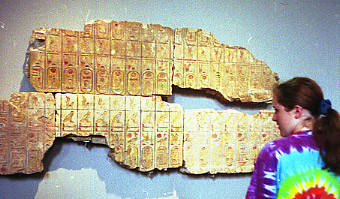I’ve known this friend for several years, yet it was only the other day, after we had said our goodbye's, that a certain aspect of her being began to edge out all my other thoughts, and it would not let go.
And as I ambled down the street, my focus was not on the words that my accompanying daughter was speaking, nor on the crossing lights as we approached. I heard her and saw them, but only dimly so.
As soon as we got home, I began to flesh out that meager snippet of an idea, removing the odd bits and refining the rest. Within an hour or so it had become a rather sweet new poem about my friend.
The next day, while researching an idea, I came across this: “Every block of stone has a statue inside it and it is the task of the sculptor to discover it.” Michelangelo. That was not … Wait ... What?
There was a distinct click in my brain, and the burst of an “aha” moment hit! His approach to intuiting the promise within a monolithic block of stone reminded me of how I “see” the formation of an idea emerging from an ethereal mass of words. Wow!
Epiphanies are such wondrous things, especially those that hit one sideways, like an abrupt, loud noise off to the left while you’re diligently focusing straight ahead. I understood this kindred artisan.
Yeah, okay. I’m no “Michelangelo,” and I doubt that I’d recognize him on the street, but a connection was made, and it is helping me to distill my conceptual framework, which is key my work in verse.
And now, here is that little poem:
But Mary Does
We’re chatting in a small cafe
Where windows keep the gray at bay
And as I answer with a shout
The hiding Sun comes bursting out
As though on cue and so we laugh
No other patron gets our gaff,
But Mary does.
A story that is often told
Is easily dismissed as old
No longer fit to entertain
Or even countered with disdain.
So few will once more hear that tale
With interest, and smile as well,
But Mary does.
Then by the jilted clock we spy,
That several hours have sped by
With total disregard of we
Who could have bantered endlessly.
I know not many who would stay
To talk an afternoon away
But Mary does.
Image: oi.uchicago.edu




 RSS Feed
RSS Feed